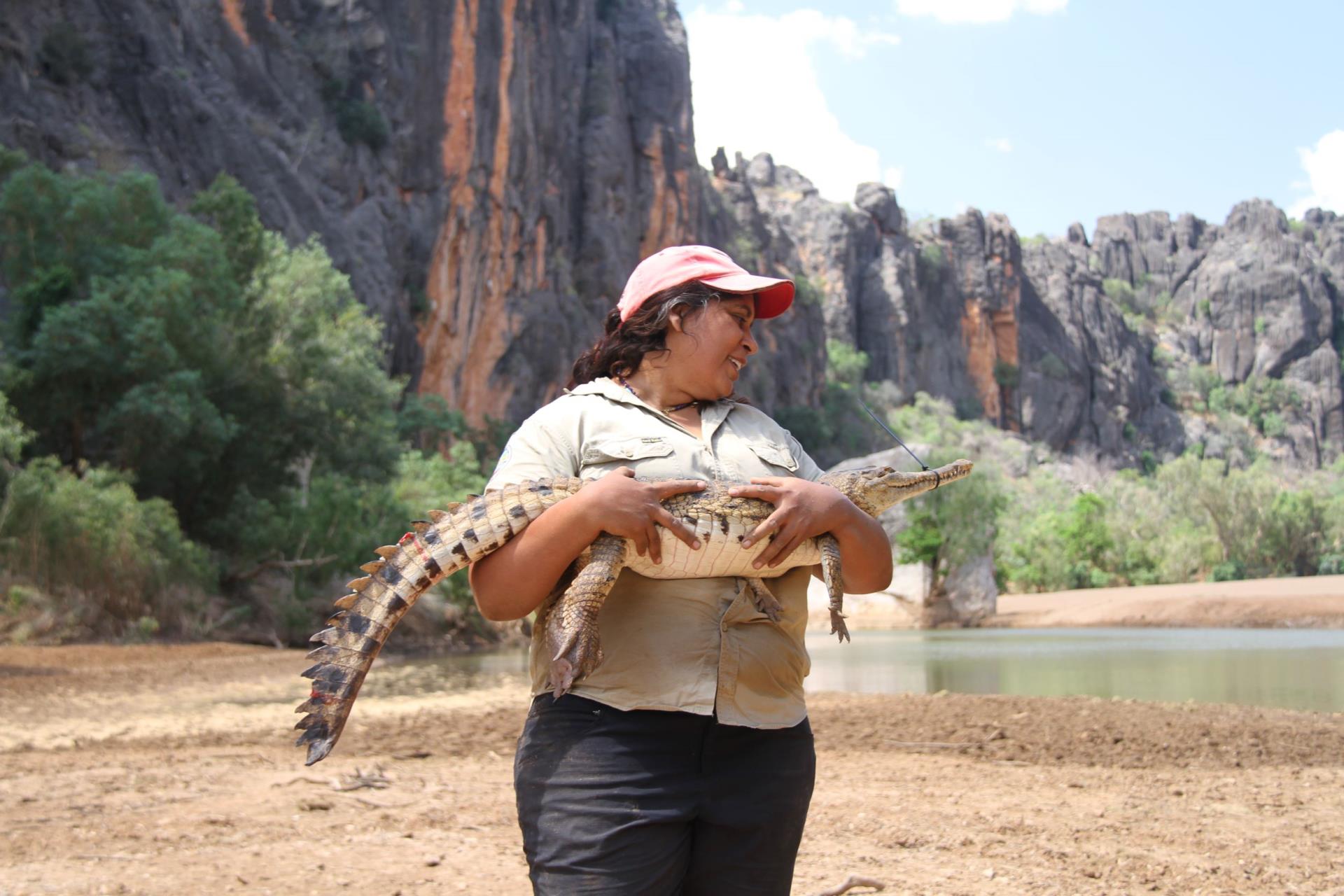Published on Tuesday, 22 February 2022 at 6:48:05 AM
 Image: Natalie Davey holding a croc as part of a 2017 wildlife survey. Photo Credit Max Jackson.
Image: Natalie Davey holding a croc as part of a 2017 wildlife survey. Photo Credit Max Jackson.
In recent weeks Natalie Davey of Fitzroy Crossing (Bunuba, Walmjarri, English and Scottish heritage) has been spending a lot of time at the river.
Her lively and informative video posts have kept many locals up-to-date about the recent floods, and her delight at being on country – especially in a work capacity - is plain to see.
“When I was a kid we’d always go down to the river when it was too hot, that was how school operated,” remembers Davey, who grew up out at Noonkanbah station in a shed and then a caravan.
“The school would operate from first light till 10am which is when we’d all go down to the river because it was too hot. It was absolutely sensible.”
Davey’s “whole upbringing” was on country, following the natural cycles of the river and flood time. Her mother was one of the first teachers in the community school at Noonkanbah and her first language was Kimberley Kriol.
Integrating her mixed heritage into mainstream workplaces and culture has been a lifelong goal for Davey, and one she is close to achieving with her recent appointment as chairperson of Environs Kimberley (EK), an environmental advocacy agency.
Formerly a Bunuba ranger for five years, Davey is passionate about pursuing work that not only pays the bills, but also nourishes her identity, and is in line with her personal and cultural values.
“It’s not just jobs or achieving a goal – I follow my heart and do what I love. When I started working as a Bunuba ranger I really started connecting back to culture and was able to speak my first language more regularly – I actually started dreaming back in Kriol,” she says.
“So it’s not just working for money it’s the whole thing of working with something that builds you, and connects you and grounds you.”
Davey says most Aboriginal people are “born into looking after country and knowing your stories and your family”.
“Looking after country is just a way of being,” she says, explaining her kinship and care for the bush, both in her private life and through work with EK.
“Over the generations, and with climate change, the stories are starting to change and that’s why I love doing seasonal observations and noting all the stories on a map. I’m constantly thinking how can I map this and talk it out but also demonstrate the changes in a mainstream way?”
For Davey the effects of climate change are already being felt around her in hotter seasons, less water and unpredictable flora and fauna patterns.
She believes without intervention Kimberley residents will become the country’s first “climate change refugees”.
“It’s an extremely scary thought and that’s why it is great to be involved in trying to change that trajectory so that generations after can stay on country looking after country.”
The “lack of relationship” between humans and country is Davey’s explanation for climate change, but she is seeing signs for optimism.
In Fitzroy Crossing traditional and western sciences are beginning to be utilised in a more integrated way, and many young people are keen to learn the skills of their elders, especially “tactile, practical skills” like hunting, horsemanship and land management.
“People learn very differently. Some people are more tactile. I am not awesome at theory and a lot of kids here are like that so what kind of supports can we create to encourage different types of learning?” says Davey.
“I love seeing kids build resilience through learning to ride a horse and getting thrown off. Where are those opportunities for kids to be able to test their skills in that way? We need way more on country learning, in my opinion, if we want to hold those kids interest.”
Back to All News